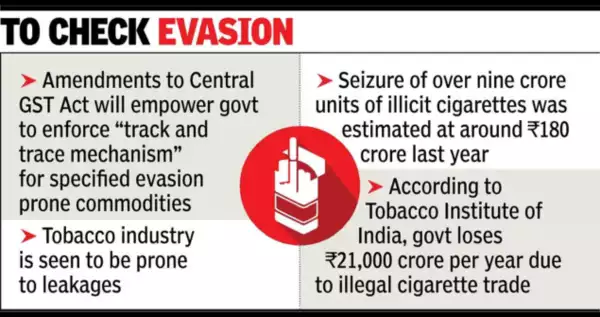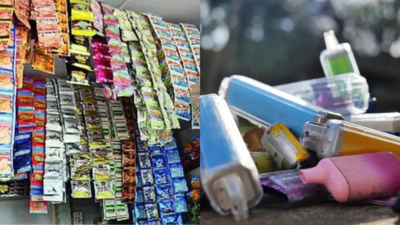
[ad_1]
JAISALMER: Cigarettes could be among the first products to be brought under the “track and trace mechanism” that was cleared by the GST Council on Saturday, with pan masala also being a likely candidate for inclusion.
The Council led by FM Nirmala Sitharaman has cleared amendments to the Central GST Act to empower govt to enforce the mechanism for specified evasion prone commodities.
“The system shall be based on a Unique Identification Marking which shall be affixed on the said goods or the packages thereof. This will provide a legal framework for developing such a system and will help in implementation of mechanism for tracing specified commodities throughout the supply chain,” an official statement issued after the meeting had said.

While several products ranging from steel and other real estate inputs and tyres see high levels of evasion, cigarettes are seen to be easier to focus on, at least initially, given that tobacco industry is seen to be prone to leakages. Besides, the Central Board of Excise & Customs has itself seen large consignments of cigarettes being stopped from being smuggled into the country, with officials and domestic industry claiming that illegal entry is rampant. Last year, seizure of over nine crore units of illicit cigarettes was estimated at around Rs 180 crore. Tobacco Institute of India has estimated that govt loses Rs 21,000 crore per year due to illegal cigarette trade.
WHO is seen to be a driver of the plan under the Convention on Tobacco Control and Protocol to Eliminate Illicit Trade in Tobacco Products.
Over the last few years, govt had been toying with the idea of using the track and trace mechanism through the excise route but could not do so and found GST to be a better route to introduce the tool, which is widely used in several parts of the world, including the European Union, the UK and Turkey, officials explained.
It potentially opens up opportunities for players such as Honeywell and Dentsu that have developed mechanisms in other countries. In India, govt has GSTN, which can develop in-house solutions.
Under the regulations in the UK and EU, all manufacturers and importers, as well as those who store, sell or transport tobacco products are mandated to register and seek unique IDs. Goods are scanned from the point of arrival for imports and dispatch in case of domestic production and from each entity that is part of the supply chain up to the retail stage. The data is transmitted electronically and can be tracked.
[ad_2]
Source link




![NZ v AUS [W] 2024/25, New Zealand Women vs Australia Women 2nd ODI, Wellington Match Report, December 21, 2024 NZ v AUS [W] 2024/25, New Zealand Women vs Australia Women 2nd ODI, Wellington Match Report, December 21, 2024](https://i3.wp.com/img1.hscicdn.com/image/upload/f_auto/lsci/db/PICTURES/CMS/393400/393416.6.jpg?w=1200&resize=1200,0&ssl=1)




